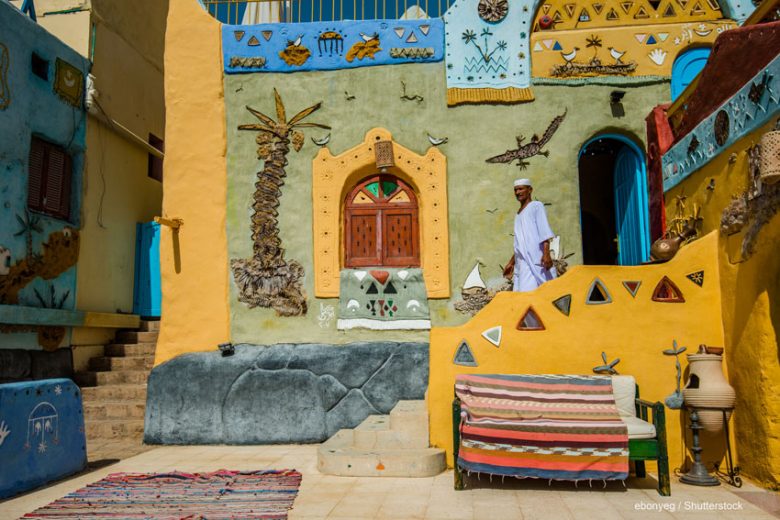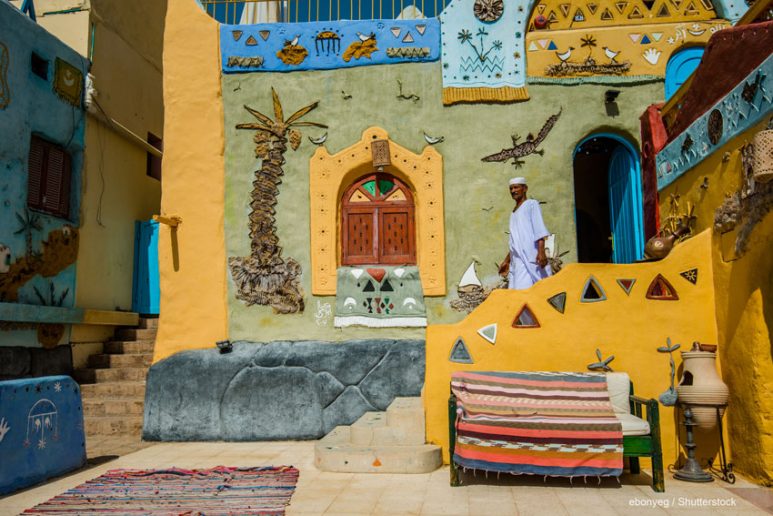By Osama Gaweesh
“You are a servant and a doorman,” said Mortada Mansour, a lawyer and a Sisi loyalist, during a TV interview in 2016. The person at the receiving end of the comments, Ahmed El Merghany, a football player from Nubia. More specifically, Ahmed El Merghany as “bawab” – a racist term often used to refer to people of dark skin in Egypt. Mansour further commented that AL-marghany was nothing but a doorman, adding fuel to the stereotype propagated by the Egyptian media that Nubians are only suited to ‘low status jobs’. This is the plight of the Nubians in Egypt.
Mohamed Azmy, a Nubian lawyer and head of Border Center for Support and Consultations criticised the Egyptian media of discriminatory behaviours towards Nubians.

“Why does the Egyptian media stereotype Nubians in low-status jobs? This is a crime in western countries. In Egypt, media promotes the discrimination of Nubians,” said Mohamed Azmy told MDI.
Once a thriving community, Nubians are indigenous to southern Egypt, but their history could be compared to that of Native Americans and Aboriginal Australians. Since the beginning of the 20th century Nubians have experienced severe neglect and exploitation under the Egyptian government, descending them into a dystopian society. Nubians have faced displacement and loss of homes several times due to the construction of the Aswan tank and the High dam on the river Nile. A lot of them were forced out of their homes and were cast-off to the harsh, arid, and undeveloped region of Nasr al-Nuba. Today Nubians form only 3% of the total Egyptian population.
“Nubians do not have demands, we have rights. Nubians sacrificed a lot. We left our homeland for the sake of Egypt to build the Aswan tank and for the high dam in 1964,” says Mosaad Herki (Head of the Egyptian Nubian Institution for Development – NGO)
Egyptians have suffered under an authoritarian rule for years. This bred individualistic thinking and intolerance among the population. This divisive thinking has led to growing hostility and antagonism towards ‘the others’, i.e., anyone who is different to what we consider ‘normal’ or ‘conventional’. One of the results of this was increasing racism towards Nubians due to not looking or sounding like what the majority of Egyptians think is the ‘normal Egyptian’.
“We are proud of our culture, language, and our skin colour. Nubians do not need to prove that they are Egyptians because we are Egyptians,” said Azmy.
For decades, Nubians have received an onslaught of racism, cultural marginalization, and discrimination propagated by the Egyptian media and the entertainment industry. A 2018 research on 60 films, 30 talk show episodes and 35 newspaper coverages conducted by Borders Centre of Support and Consultation showed that the Egyptian media grossly misreported the figures of the Nubian issues in 2017; and discrimination and racism towards the Nubians was severely underreported.
“This is a systematic approach by both the state and its media against Nubians. They have worked for decades to humiliate Nubians and discriminate against us based on skin colour and culture,” Azmy tells MDI.
Just last month, following Sisi’s speech on promoting birth-control in Egypt, Tamer Amine, a TV reporter and a supporter of the regime, suggested that the Northern Egyptians (which includes Nubians) “raised their many children to be servants”. Though this incident brought local outrage forcing Amine to apologize, such callous words by prominent figures in the media limelight has normalised racism and marginalisation of minorities.
The portrayal of Nubians or black characters in Egyptian films and soap-operas clearly highlights the mindset of the people. For decades the Nubians have been made into a caricature on TV and in films. Jokes about their language, their accents and their skin colour became the norm.
Azmy also believes that TV channels will not hire Nubian reporters due to their dark skin. The Egyptian media contributed to false stereotypes becoming the defining characteristics for the Nubians to a large degree.
“Of course, there is media discrimination against Nubians, Egyptian media, and film makers stereotype Nubians as servants, doormen, and black people. This is racism,” said Azmy.
Talking about the regime, Herki highlighted the Nubians’ support to President Sisi.
“We have supported president Sisi from his day one at the office. We understand the critical situation which Egypt faced in the last decade. We completely support the country and stand in solidarity with the Egyptian regime,” he said.
Though, Herki also expressed disappointment over how the regime reciprocated.
“However, the regime dealt with us differently. Last year the Ministry of Justice asked some Nubians to sign a compensation form to have money or a property in another governorate and leave Nuba land. When the state becomes strong it should not be strict on its people or ignore their rights. I believe that the media have concerns to discuss Nubians’ rights now,” he said.
Azmy, however, disagrees.
“Sisi’s regime is the worst one for us. They arrested many Nubian activists in 2016 and 2017. Although article 236 in the Egyptian constitution is about Nubians’ right to return to their homeland, this regime keeps targeting Nubians’ activists and ignoring our rights,” he says.
The constant displacement of Nubians, the systemic repression and cultural oppression have led to the decline of yet another rich culture. The Nubian language is vanishing from existence too as a result of the dissolution of the Nubian identity.
“I sent several requests to the state and to some Egyptian universities to teach the Nubian language in these universities, unfortunately, they declined,” said Herki.
Sadly, today, no young Nubian can claim to speak their native language.
This can be classified in the context of cultural racism, claiming the superiority of the people of one language (Arabic in this case) over another (Nubian). This is a serious threat to the existence of the already shrinking Nubian culture and community.
Sharing their thoughts on what they hope the government will do for the Nubians, Herki said,
“the media should speak more about us and give us more space to express our thoughts. I wish that the regime supports our rights and understands our demands.”
Azmy has a less hopeful view in the matter.
“I cannot describe what the media is doing as ignorance of Nubians’ rights. It is racism, it is discrimination, media humiliates us, and the government supports these media policies and turns a blind eye to Nubians’ complaints.”
The media around the world has the power to skew public opinion. They have a responsibility to state the facts and not play into the right-wing politics, especially if it is to the detriment of a group or community in society. While the Western media has been actively fighting against racism and oppression of minorities with movements like the ‘Black lives matter’, the Egyptian media has become instrumental in oppressing the already oppressed Nubian population in Egypt.

